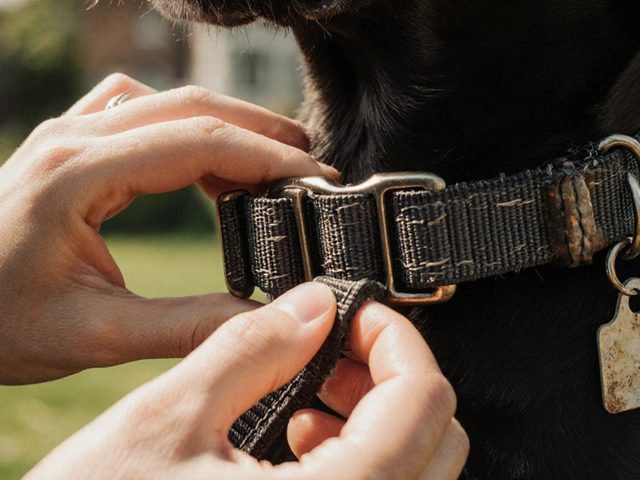Have you ever wondered if that trendy coconut oil you're using in your kitchen could do wonders for your dog, too? You're not alone! As it turns out, coconut oil isn't just a hit among us humans—our four-legged friends might also benefit from it in some interesting ways.
Let's start with the basics. Coconut oil is primarily made up of medium-chain triglycerides, or MCTs, which are fats that can potentially boost your dog's energy and improve various aspects of their health. This could mean shinier fur, better digestion, and even an immune system that's more up to par.
Yet, while there are potential perks, it's not all sunshine and rainbows. Overdoing it might lead to weight gain or upset stomachs in your pooch, so moderation is key. Stick around to find out how you can safely integrate coconut oil into your dog's diet without the worry of going overboard.
- A Closer Look at Coconut Oil
- Health Benefits for Dogs
- Potential Risks of Overuse
- Tips for Safe Usage
A Closer Look at Coconut Oil
Coconut oil has been making waves in the health world with its versatile uses, but what's behind all the hype? At its core, coconut oil is packed with medium-chain triglycerides (MCTs), which are unique fats that quite frankly, have some promising perks for both humans and dogs. These MCTs are known to be a quick energy source and may even help in maintaining a healthy weight—a topic that catches every dog owner's attention.
The Composition of Coconut Oil
Let's break it down a bit more. The major fatty acids in coconut oil, like lauric acid, are known for having antimicrobial properties. This means they might help fend off pesky bacteria and viruses, which could be a boon for your dog's skin and overall health. Plus, with its natural antioxidants, coconut oil might even contribute to better cognitive functions as your dog ages. Pretty neat, right?
Types of Coconut Oil
- Virgin Coconut Oil: This is the least processed and possibly the healthiest option for your dog since it retains more nutrients.
- Refined Coconut Oil: Although it's processed more, it’s often cheaper and still has many benefits but may lack some nutrients found in its virgin counterpart.
Why Quality Matters
Not all coconut oils are created equal, especially when it comes to dog supplements. You want to pick organic, non-GMO options to ensure the best benefits for your furry friend. Keep an eye out for any added chemicals or preservatives. Trust me, your dog deserves the purest stuff you can get.
Considering the amount of interest in canine nutrition, it's no wonder coconut oil is popping up everywhere in dog health. But remember, it's all about balance. In moderation, this oil can be a delightful addition to your pet's diet. Stay tuned to discover how to introduce it safely and effectively!
Health Benefits for Dogs
When it comes to boosting your furry friend's wellbeing, coconut oil for dogs might just surprise you with its benefits. One of the main perks? A potential improvement in their skin and coat. Thanks to the medium-chain triglycerides in coconut oil, many pet owners report a significant reduction in dog dandruff and a coat that looks silkier and shines more than ever.
And it's not just about aesthetics. Coconut oil is said to have antibacterial and antifungal properties, which can aid in alleviating minor skin issues like irritations and infections. This means if your pup has been scratching a little too much lately, coconut oil could be your secret weapon.
Boosts Digestion and Nutrient Absorption
Ever heard of a dog struggling with their tummy troubles? Coconut oil might help. It can aid in digestion and help with nutrient absorption, potentially reducing unpleasant issues like bloating and gas. Some pet parents use it as a natural, gentle laxative when their dogs are constipated.
Supports a Healthy Immune System
An intriguing aspect of canine nutrition involves keeping your dog's immune system robust. The lauric acid found in coconut oil has potential benefits in fighting harmful bacteria and viruses, giving your dog's immune defenses an extra boost.
Energy and Metabolism
If your dog needs a little pep in their step, coconut oil could provide that energy kick without adding too many extra calories. The MCTs in coconut oil are quickly absorbed by the body and converted to energy, making it an efficient source of fuel for active or older dogs who might need that extra bit of energy.
| Benefit | Details |
|---|---|
| Shinier Coat | Improves fur health, reduces dandruff |
| Digestion | Aids in relief from bloating, helps nutrient absorption |
| Immune System | Lauric acid boosts defenses against bacteria and viruses |
| Energy | Provides quick energy, supports metabolism |

Potential Risks of Overuse
Alright, here's the thing—like any good stuff, there can be too much of a good thing. Overloading on coconut oil for dogs isn't without its pitfalls. One of the first things you might notice is weight gain. Yup, those calories can sneak up if you're not paying attention. Think of coconut oil as tasty, healthy fat, but still a fat.
Digestive Upsets
More isn't always better, especially with our furry pals. Give too much too fast and expect to see some tummy trouble. We're talking loose stools or even diarrhea. Not quite what you envisioned when thinking about boosting their health, right?
Allergic Reactions
Then, there's the slim chance that your dog might be allergic. So, it's a good idea to chat with your vet before diving headfirst into this new supplement regimen.
How Much is Too Much?
It boils down to quantity. Start small, like a quarter of a teaspoon per day for small dogs or a teaspoon for larger ones. See how they react. Adjust as needed, but keep it moderate. Below is an easy guide:
| Dog Size | Recommended Coconut Oil |
|---|---|
| Small Dogs (Up to 20 lbs) | 1/4 to 1 teaspoon daily |
| Medium Dogs (21-50 lbs) | 1 teaspoon to 1 tablespoon daily |
| Large Dogs (51 lbs and up) | 1 to 2 tablespoons daily |
Remember, every dog is different, and you know yours best. Monitor their response, and don't hesitate to dial it back if you see any signs of tummy distress or other odd reactions. The goal is to enhance their life, not complicate it.
Tips for Safe Usage
Thinking of adding coconut oil to your dog's diet? Here are some practical ways to do it safely. It's all about balance—start slow, and keep an eye on how your furry friend responds.
Introduce Gradually
If your dog has never tried coconut oil before, it's best to take it slow. Start with a small amount, like a quarter teaspoon for smaller dogs, or a teaspoon for larger ones. Mix it in with their food and gradually increase the amount over a week.
Watch for Reactions
Just like humans, dogs can have different reactions to new foods. Keep an eye out for any changes in their poop, energy levels, or coat condition. If you notice anything off, it might be best to pause and consult your vet.
Quality Matters
Not all coconut oil is created equal. Look for organic, virgin cold-pressed oil. It's closer to its natural state and usually contains more of the good stuff that benefits your pooch.
Balance Is Key
Remember, too much of a good thing can turn bad. If your dog starts gaining weight or gets an upset stomach, reduce the amount. It's often best to consult with your vet to figure out the optimal amount for your dog's size and health condition.
Regular Monitor
Monitoring your dog's weight and health indicators can give you insights into how well they're tolerating the coconut oil. Regular check-ups with the vet are always a good idea.







